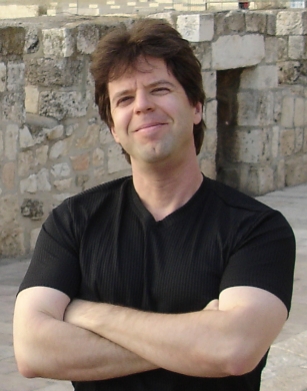 Gabriel Robins News - Robins Tackles Computing Problems
Gabriel Robins News - Robins Tackles Computing Problems Robins Tackles Computing Problems
Reprinted From Inside UVa
November 10, 2000By Charlotte Crystal
Gabriel Robins
awakened to the capabilities of computers when he was 7 or 8 years old
and saw the movie, "2001: A Space Odyssey." Hal 9000, the
spaceship's intelligent onboard computer, left an indelible mark
on Robins' mind. "Computers are an amazing tool that
magnifies the capabilities of our brain," said Robins, the Walter
N. Munster Associate Professor of Computer Science at the School of
Engineering and Applied Science. "Other tools -- cars, engines,
planes, submarines, helicopters -- are mundane by
comparison. Computers are in a class all by themselves."
Thanks to a program for gifted children at Bar-Ilan University in Tel
Aviv, Israel, Robins began at an early age to pursue what would become
a lifelong interest in computers.
Robins possesses a
working knowledge of dozens of computer languages, operating systems
and hardware platforms. He has addressed a variety of
specific problems in computer science, but most fall under the
rubric of "optimization" -- finding simpler ways for
computer hardware and software programs to solve increasingly
complicated problems faster and cheaper.
A major research
interest of Robins' is interconnections and finding the best
ways to connect components' Another area of interest involves
working with semiconductor manufacturers to increase the production
yield of computer chip manufacturing plants.
Other applications of his research include the field of logistics,
where dispatchers seek the shortest, simplest routes connecting a
number of (potentially moving) destinations. And the U.S. Army uses
his work in landmine detection.
For fun, he does math, with
serious results. An algorithm Robins developed -- a solution for a
long-standing math problem, "the discrete Plateau problem of
minimal surfaces" -- was published in the Proceedings of the
National Academy of Sciences in 1992 and received national
news coverage.
Since joining the U.Va. faculty in 1992, Robins has won awards, the
National Science Foundation Young Investigator Awards ($312,500) and the Packard Foundation Fellowship
($500,000). And as co-principal investigator, he secured three grants
from the National Institutes of Health's National Library of
Medicine (for more than $3.1 million).
Robins' personal recipe for success is based on persistence.
"Most billionaires had many, many failures and one good
idea," Robins said. "One good idea makes up for many
failures. My philosophy of life is, don't be afraid to fail, but
fail fast. You will probably fail many times in your life. Just fail
fast and move on until eventually you get to success."
See more news articles about Professor Robins. 
